Incumbent Re-Election Rates And The 2010 Elections
Several of the comments to this post have focused on the issue of incumbent re-election rates in the United States, so I thought it would be useful to look at the actual numbers, and ponder what might happen in 2010.
First, here’s a chart showing the incumbent re-election rates for the House of Representatives going back to 1964:
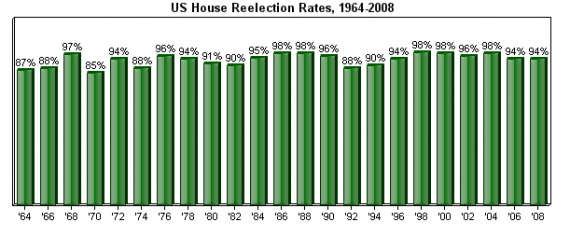 As you can see, there was only one time in the past 46 years when 15% of the sitting members of the House were booted out of office, in the Elections of 1970. Even the s0-called “Republican Revolution” of 1994 saw 9o% of the incumbents seeking re-election succeed in their efforts, and that was in a year when 54 seats switched hands. Even 2006 and 2008, which saw Democrats pick up 31 and 21 seats respectively, resulted in a 94% re-election rate for incumbents.
As you can see, there was only one time in the past 46 years when 15% of the sitting members of the House were booted out of office, in the Elections of 1970. Even the s0-called “Republican Revolution” of 1994 saw 9o% of the incumbents seeking re-election succeed in their efforts, and that was in a year when 54 seats switched hands. Even 2006 and 2008, which saw Democrats pick up 31 and 21 seats respectively, resulted in a 94% re-election rate for incumbents.
Things are a little different in the Senate:
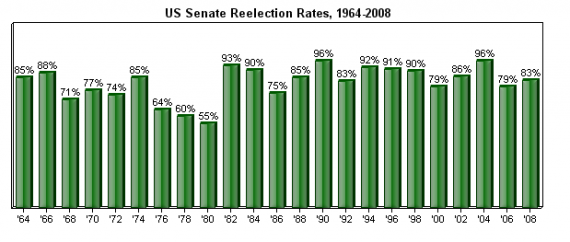 Interestingly enough, there’s been much more variation in incumbent re-election in the Senate than in the House, even though the Senate is often thought of as being the less democratic branch. Partly of course, this is due to the fact that a single election result will have a larger impact given that there are typically only 33 Senate seats up for re-election in any given year.
Interestingly enough, there’s been much more variation in incumbent re-election in the Senate than in the House, even though the Senate is often thought of as being the less democratic branch. Partly of course, this is due to the fact that a single election result will have a larger impact given that there are typically only 33 Senate seats up for re-election in any given year.
So what does this mean for 2010 ? Well, if history is any guide, then it seems very likely that we’ll see something in the range of 90-94% of the incumbents in the House of Representatives who are up for election win their races. As 1994 demonstrates, of course, this still means that there could be a change in party control, but a change in party control is not the same thing as a change in personnel. In the Senate, on the other hand, a change of, say, six seats would drop of the incumbent re-election rate to 81%, but would not give the Republicans control of the Senate. To do that, they’d need to pick up 11 10 seats, which seems incredibly unlikely.
Given all the natural advantages they have, I think it’s fairly clear that most incumbents in Congress will survive this wave of anti-incumbency just like they’ve survived all the others.
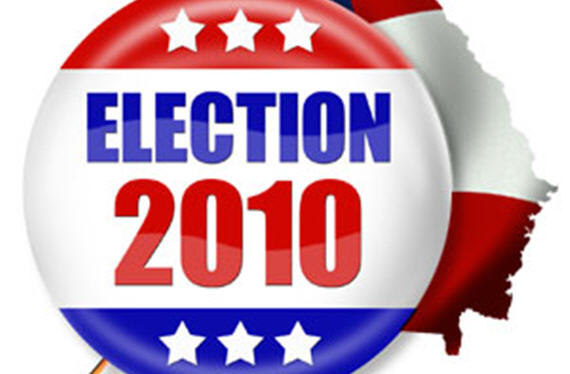



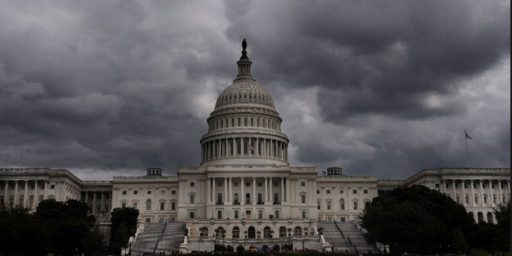
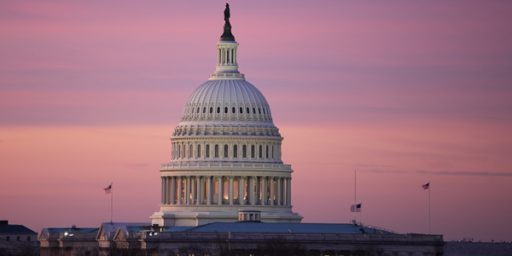
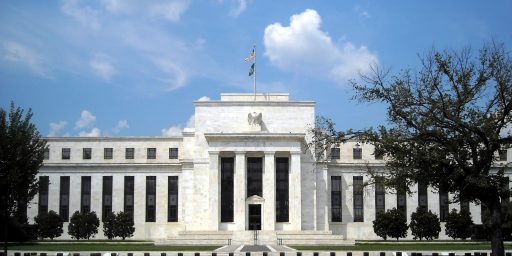
I think everyone knows that they’ve games the system to reduce the number of competitive seats so as to entrench themselves. And I think everyone knows that even in a bad year for incumbents, it’s mostly other people’s incumbents voters want gone. So there’s been a lot of battlespace preparation to minimize the meaning of the bloodletting that’s coming by pointing out how many incumbent are not losing yet.
That’s the wrong metric. We already tied the highest number of incumbents to lose their primary of the last 30 years: 4 in 1980. And we still have some to go — including a few where the officeholder is in trouble. That number isn’t very high but, since the whole system is geared to keep it low, we rarely meet it. And yet this year we hit it pretty early. That tells you more about the political environment than your charts do.
BTW, it’s 10 seats, not 11. Scott Brown is #11.
I am not sure that I am on board with the “anti incumbent” wave that is supposedly coming. I mostly believe in general people do hate everyone else’s congress members but tend to like their own.
But I do think people are becoming less party loyal, and I think there will be a trend in competitive areas where there isn’t a massively skewed lean to one party or the other, we will probably see more fluctuation, although I am not sure that it is necessarily anti incumbency so much as a core group of true independent voters who are more than willing to swing to the other party, if they don’t think a congress member is living up to their promises.
I think one reason the senate may see less fluctuation is probably because a senator often has more time to recover from scandal-or at least the more minor ones. I also wonder if the fact that the senate is state wide may affect job security. A swing to one party in a district is going to be hard for a house member to overcome if it is large enough, while there may be portions of the state for a senator that can still bring in the votes.
Dodd,
How does that number from 1980 break down? So far 2 of the incumbent losses this year have been party switchers. Someone yelling “Hey I’m one of you now!” and then those voters deciding they don’t necessarily want him/her in their party doesn’t strike me as anything unusual. So I was wondering if that was the same case in 1980, or were those 4 true incumbent losses?
Of course tomorrow the number of true incumbent losses may be up to 3, depending on the Lincoln/Halter run-off. If Lincoln loses, we are still on track to tie/beat the 1980 number.
That said, I still don’t from where 15%-loss of the two houses is coming.
Actually Doug, a 10% swing is large enough to change the majority in the house or the senate, so putting out a number like 85% of incumbants will get reelected is sort of not important and the only numbers that count in the end are those which effect changes of power in the congress. However it will be interesting to watch to see if the anger is real as I suspect it is that this congress has so indebted the nation. Remember when Obama lies and said job creation was his most important problem? He sure has not acted like it. He knew about the magnitude of the oil like days after it happened and he did nothing. Are you familiar with Cloward-Piven?
The article is using the 15% number because you are the one who was using it in an earlier post. A post which spurred this post. Idiot.
It’s an anti Democrat wave coming, not an anti incumbent wave. Those aligned with the President or Democratic leadership and their policies are facing trouble more than any other group. 5%, 10%, 15%, it doesn’t matter. What matters is control of Congress and sending a message about spending. That message is already taking hold.
During the last administration Republicans, in control of both houses of the Congress until 2006, showed little concern about spending. They talked a good show but their actions were something else again. An anti-Democrat wave that replaces Democratic control of the House with Republican control of the House but leaves most of the usual suspects in place and goes back to business as usual will be meaningless.
http://www.youtube.com/watch?v=hK8EmZLfYiU
Dave,
Those Republican spending levels were about a third of what we see now under the Democrats. Going back to that isn’t perfect but it’s more than meaningless.
That should be a third of the deficit levels, not spending levels.